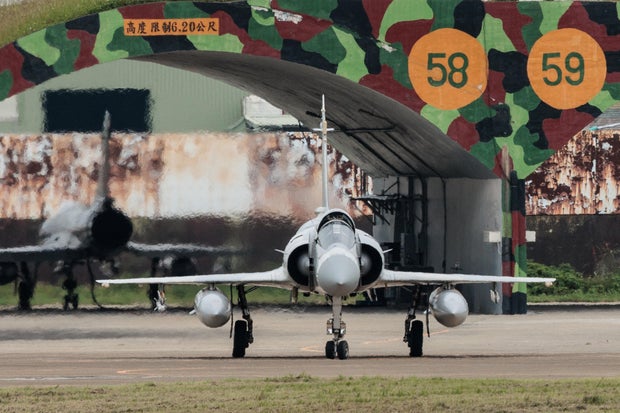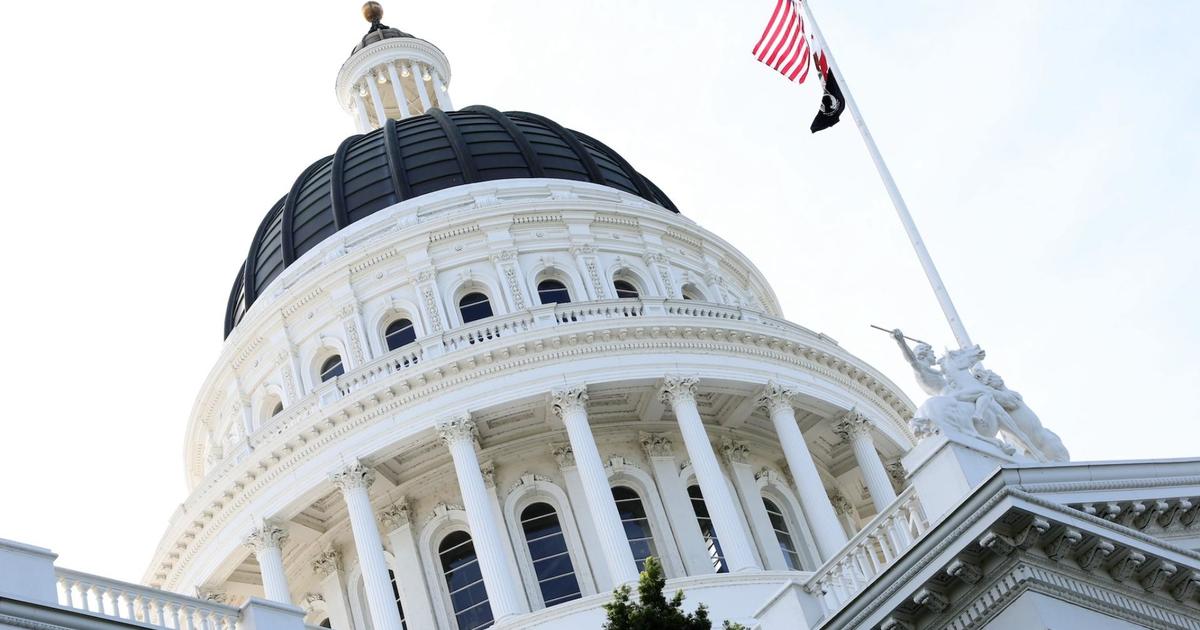[ad_1]
Taipei, Taiwan — Taiwan scrambled jets and put missile, naval and land units on alert Thursday over Chinese military exercises being conducted around the self-governing island democracy where a new president took office this week. China‘s military said its two-day exercises around Taiwan were punishment for separatist forces seeking independence.
Beijing claims Taiwan is part of China’s national territory and the People’s Liberation Army sends navy ships and warplanes into the Taiwan Strait and other areas around the island almost daily to wear down Taiwan’s defenses and seek to intimidate its people, who firmly back their de facto independence.
Taiwan stands firm, says China threatening regional peace
China’s “irrational provocation has jeopardized regional peace and stability,” the island’s Defense Ministry said. It said Taiwan will seek no conflicts but “will not shy away from one.”
“This pretext for conducting military exercises not only does not contribute to peace and stability across the Taiwan Strait, but also shows its hegemonic nature at heart,” the ministry’s statement said.
In his inauguration address on Monday, Taiwan’s President Lai Ching-te called for Beijing to stop its military intimidation and pledged to “neither yield nor provoke” the mainland Communist Party leadership.
YASUYOSHI CHIBA/AFP/Getty
“Facing external challenges and threats, we will continue to maintain the values of freedom and democracy,” Lai told sailors and top security officials Thursday as he visited a marine base in Taoyuan, just south of the capital Taipei.
While not directly referring to China’s moves, he said international society was concerned about Taiwan’s security, a likely reflection of its key role in supply chains for the most advanced computer chips as well as a democratic bulwark against Chinese moves to assert its control over the Asia-Pacific.
Lai has said he seeks dialogue with Beijing while maintaining Taiwan’s current status and avoiding conflicts that could draw in the island’s chief ally, the U.S., and other regional partners such as Japan and Australia.
The main opposition Nationalist Party, which is generally seen as pro-China, also condemned Beijing’s actions.
The Nationalists, also known as the KMT, called on “the opposite side of the (Taiwan Strait) to exercise restraint, cease unnecessary maneuvers, avoid a conflict in the Taiwan Strait and maintain and cherish the results of peace and development between the sides.”
Thursday’s tension came amid protests outside Taiwan’s legislature against moves by the Nationalists and allies to use their slim majority to force through legislation that could affect military budgets and key judicial and other appointments.
China calls drills “powerful punishment” for Taiwan
The People’s Liberation Army’s Eastern Theater Command said the land, navy and air exercises around Taiwan were meant to test the navy and air capabilities of the PLA units, as well as their joint strike abilities to hit targets and win control of the battlefield, the command said on its official Weibo account.
“This is also a powerful punishment for the separatist forces seeking ‘independence’ and a serious warning to external forces for interference and provocation,” the statement said.
The PLA also released a map of the intended exercise area, which surrounds Taiwan’s main island at five different points, as well as places like Matsu and Kinmen, outlying islands that are closer to the Chinese mainland than Taiwan.
China’s coast guard also said in a statement that it organized a fleet to carry out law enforcement drills near two islands close to the Taiwanese-controlled island groups of Kinmen and Matsu just off the Chinese coast.
While China has called the exercises punishment for Taiwan’s election result, the Democratic Progressive Party has now run the island’s government for more than a decade, although the pro-China Nationalist Party took a one-seat majority in the parliament. As CBS News senior foreign correspondent Elizabeth Palmer reported before the vote, China had characterized the last Taiwanese elections as a choice between peace and war.
Before Lai won, China’s government said he “would continue to follow the evil path of provoking ‘independence,'” taking Taiwan “ever further away from peace and prosperity, and ever closer to war and decline.”
U.S. says China’s actions expected, but must be condemned
Speaking in Australia, Marine Corps Lt. Gen. Stephen Sklenka, the deputy commander of the U.S. Indo-Pacific Command, called on Asia-Pacific nations to condemn the Chinese military exercises.
“There’s no surprise whenever there’s an action that highlights Taiwan in the international sphere the Chinese feel compelled to make some kind of form of statement,” Sklenka told the National Press Club of Australia in the capital Canberra, in a reference to Monday’s presidential inauguration.
“Just because we expect that behavior doesn’t mean that we shouldn’t condemn it, and we need to condemn it publicly. And it needs to come from us, but it also needs to come, I believe, from nations in the region. It’s one thing when the United States condemns the Chinese, but it has a far more powerful effect, I believe, when it comes from nations within this region,” Sklenka added.
Japan’s top envoy weighed in while visiting the U.S., saying Japan and Taiwan share values and principles, including freedom, democracy, basic rights and rule of law.
“(Taiwan) is our extremely important partner that we have close economic relations and exchanges of people, and is our precious friend,” Foreign Minister Yoko Kamikawa told reporters in Washington, where she held talks with Secretary of State Antony Blinken.
She said the two ministers discussed Taiwan and the importance of the Taiwan Strait, one of the world’s most important waterways for shipping, remaining peaceful.
The standoff over Taiwan has already had an impact on Japan’s people. In April, CBS News’ Palmer visited a tiny island at the southern end of the Japanese island chain, Ishigaki, which has for years been a laid-back oasis surrounded by tranquil turquoise seas.
But amid the tension with China and the looming threat posed by Kim Jong Un’s regime in nuclear-armed North Korea, Japan’s military has installed a missile base right in the middle of the island, where about 600 soldiers and a battery of powerful missiles and launchers are now positioned. Many residents feel the base has cast a shadow of looming conflict over their island paradise, but the commander at the base told CBS News it was necessary, given the security challenges facing Japan.




